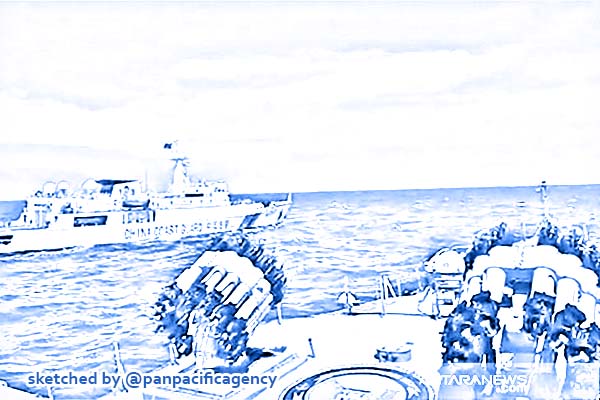New Chinese coast guard law isn’t threat of war: Philippine embassy

Video screen shoot of KRI Tjiptadi-381 drove out Chinese coast guard trespassed into Indonesia's Exclusive Economic Zone (EEZ) in Natuna Waters, Riau Islands on Dec 30, 2019. ANTARA PHOTO/HO/PR of First Fleet Command/pras. Sketched by the Pan Pacific Agency.
MANILA, Feb 2, 2021, PhilStar. China’s new law authorizing its coast guard to fire on foreign vessels is not a threat of war and does not specifically target any country, the Chinese embassy in Manila said yesterday, The Philippine Star reported.
The formulation of its new law, the embassy said, is a normal domestic legislative activity of China and its content conforms with international conventions and the practices of the international community.
“Enacting such a coast guard law is not unique to China, but a sovereign right to all. Many countries have enacted similar legislation. It is the Philippine Coast Guard Law of 2009 that established the PCG as an armed and uniformed service. None of these laws have been seen as a threat of war,” the embassy said in a statement, adding that the enactment of the law does not indicate any change in China’s maritime policy.
It said China has always been committed to managing differences with countries, including the Philippines, through dialogue and consultations and upholding peace and stability in the South China Sea.
Code of conduct in SCS not dead
Meanwhile, as the law took effect yesterday, Malacañang denied that the binding code of conduct for South China Sea claimants is dead.
Retired Supreme Court senior associate justice Antonio Carpio recently claimed that the code of conduct is dead because of the adoption of China’s coast guard law.
Carpio, a key personality in the Philippines’ legal victory against China’s claim, has expressed suspicion that Beijing would only sign the code after finishing its artificial islands in disputed areas, barring other claimants from building structures.
Presidential spokesman Harry Roque disagreed, saying claimants are still holding talks on the matter.
“As to whether or not the code of conduct is dead, I don’t think so because it is still accepted and being discussed by countries with claims in the West Philippine (South China) Sea,” Roque said at a press briefing.
Roque said a party whose rights have been violated is needed to assail the validity of China’s coast guard law.
“So far, there is none. Let’s wait. Let’s see how it will be enforced. For now, we have filed a diplomatic protest and we leave it at that,” the Palace spokesman said.
Under the law passed by Chinese lawmakers last month, China’s coast guard can “take all necessary measures” to prevent maritime incursions, including demolishing structures made by foreigners on Beijing claimed reeds and islands.
The Philippines, one of the five claimants disputing China’s wide-reaching claim in the resource-rich South China Sea, has protested the law.
Roque reiterated that the laws adopted by countries should be consistent and in conformity with international law.
Asked if the Philippines and other members of the Association of Southeast Asian Nations (ASEAN) would go to the United Nations to contest the law, Roque said it would depend on the decision of the regional bloc’s foreign ministers.
He, however, claimed the issue involving China may not be brought before the International Court of Justice because of the absence of a consent to undergo litigation.
“The possible venues where we can discuss this controversy is limited,” Roque said in Filipino.
Roque said the issue can be brought to the International Tribunal for the Law of the Sea, noting that China is a party to the United Nations Convention on the Law of the Sea.
“So there is a probability, but the decision on whether or not to actually do so will be dictated by national interest, not only of the Philippines, but also of the different ASEAN countries,” Roque said.